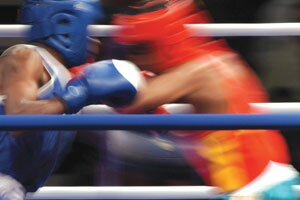THE SPORTS DOCTOR- Deadly blows: When should a ref stop a fight?

You probably didn't see the fight. Who stays up late on a Saturday night to watch a co-main event for the interim WBA world welterweight title? Dedicated boxing fans only– and even they know the featherweight division isn't very glamorous at the moment.
But if you did catch the match between Indonesian Daud Yordan (25-0) and Panamanian Celestino Caballero (33-2), you saw a fight worth remembering.
However, it wasn't either boxer's skill or talent that made the fight memorable, as the 12-round bout lacked action-packed flurries and knockdowns. But what can only be described as a solid and systematic beat-down very well could have ended with one man's victory and the other man's death.
What would you do if you were refereeing a fight during which one man was being punched an average of 27 times every three minutes for 36 minutes?
That's what happened to Yordan: Caballero landed 325 of the 1,248 total punches he threw in the April 10 fight.
Would you have called the fight? Would have made any difference if you had been able to figure out that Yordan was throwing only 379 total punches? That he only landed eight jabs and 97 power punches while Caballero landed 82 jabs and 243 power punches?
What would you have done?
Last November, 25-year-old Francisco Rodriquez died after losing a brutal USBA super bantamweight fight against Teon Kennedy. After the fight was stopped in the tenth round, Rodriquez lost consciousness sitting in his corner. Despite immediately receiving oxygen, being rushed to the hospital, and having emergency brain surgery, the former Golden Glove champion never regained consciousness and died two days later.
Marco Nazareth's fight didn't last 10 rounds– it was called with one second left in the fourth. In July of 2009, the 23-year-old light welterweight lost by technical knockout to Omar Chávez, son of Julio César Chávez.
Omar Chávez knocked Nazareth down in the first round and pummeled him for the remainder of the fight. Feeling dizzy after it stopped, Nazareth passed out and was taken to the hospital for emergency brain surgery. Tests done before and during surgery revealed that only 10 percent of Nazareth's brain was functioning. He died four days later.
When boxers die during or after a fight, it's usually due to subdural hematomas, or bleeding on the brain. And it's not uncommon.
In 2005 in Las Vegas, two lightweight fighters, Martin Sanchez and Leavander Johnson, died of brain injuries within three months– and that's just one year in one city. In both cases, referees stopped the fights because the boxers were receiving a battery of vicious blows to the head.
No referee wants a boxer to die, but no referee wants to upset fans and lose potential jobs by calling a fight too early. When it comes to the head, there's a fine line between receiving punches– an inherent part of boxing– and getting killed.
By the time a boxer seems hurt, it's too late: the damage to the brain is done. And how much more dangerous are injuries that are even less obvious?
For Daud Yordan, it's too early to tell if the Caballero fight will be the end of him. The beating Caballero gave him wasn't about the head; it was focused on the body, and there was no way the referee was going to call the fight, no matter how vicious the blows to vital organs.
And they were vicious– so vicious that HBO boxing commentator Larry Merchant actually approached the commissioner about stopping the fight (he was rebuffed). The beating was so terrible that Jim Lampley expressed doubts that the previously undefeated Yordan has any future left in the sport of boxing.
The Yordan-Caballero fight is memorable because it reminds everyone that blows to the body are just as dangerous as blows to the head. It's a lesson officials and referees need to learn.
In the last 35 years, about 50 boxers have died after sustaining injuries in the ring. Dedicated boxing fans who saw Saturday's fight realize how lucky Yordan was to walk away, and how it never should have been a matter of luck at all.
~
Juanita Giles lives in Keysville where she makes videos and updates her Sports Doctor site.
#